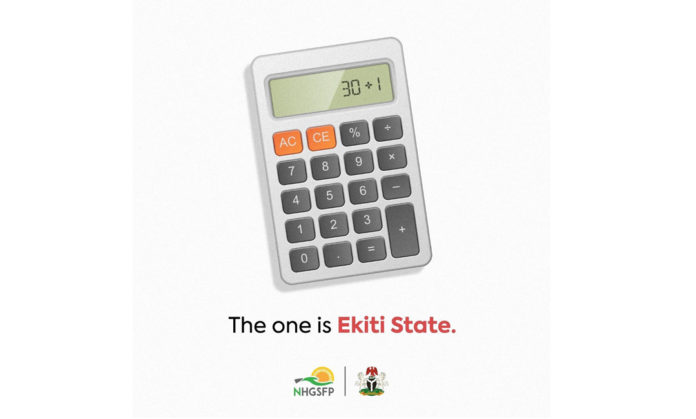REMARKS BY HIS EXCELLENCY, PROF. YEMI OSINBAJO, SAN, VICE PRESIDENT OF THE FEDERAL REPUBLIC OF NIGERIA, AT THE LAUNCH OF THE HOMEGROWN SCHOOL FEEDING PROGRAMME IN EKITI STATE, MAY 7TH, 2019
I am truly pleased to be here this morning at the flagging off of the Homegrown School Feeding Programme of Ekiti State.
As we are all aware, the Homegrown School Feeding Programme is one of the four components of the Social Investment Programmes of the Federal Government. The others, as you’ve been told, are the N-Power, Government Enterprise and Empowerment Programme, GEEP, which includes TraderMoni, MarketMoni and FarmerMoni and Conditional Cash Transfers.
The Homegrown School Feeding Programme is one where the Federal Government provides one balanced meal a day to children in government primary schools.
But why do we provide the meals?
The most important reasons are; children in their growing years must be well fed. We have in Nigeria, a significant malnutrition problem. When a child suffers from malnutrition at an early age, they may become mentally stunted for life.
Secondly, surveys show that learning outcomes are significantly improved when children are not hungry while in school.
Thirdly, practically everywhere, the Homegrown School Feeding Programme has led to increased enrollment in schools and more regular attendance of children in schools.
Why do we describe our own School Feeding Programme as Homegrown? It is because we get all the ingredients for the food we serve the children from farms in the State so that farmers are empowered and we also engage the cooks locally, especially women living around the school area.
Today as you’ve heard from His Excellency the Governor, Ekiti State becomes the 31st State in the National School Feeding Programme.
Every day now in 31 States, we feed 9,536,860 children in 56,604 schools; 101,913 cooks have been engaged and over 100,000 smallholder farmers linked to the programme, supply ingredients every week.
So every week, the School Feeding Programme procures, prepares and distributes 767 cows, 138,000 chickens, 7,260,862 million eggs, and 94 metric tons of fish.
Ekiti State clearly stands to benefit, both in terms of the health of the children in school, but also economically by virtue of the numerous linkages to jobs and opportunities.
From today as you’ve heard, 75,020 children in this State will be fed daily and over 2,000 cooks and support staff will be employed as part of this programme. All of them, of course, would be Ekiti State indigenes.
Let me commend the vision and farsightedness of Governor Kayode Fayemi, not just for ensuring the implementation of this programme, but also for supporting all the other Social Investment Programmes of the Federal Government.
Today, Ekiti State has 10,563 young men and women employed under the N-Power Programme, 9,760 beneficiaries of the MarketMoni loans and 43,701 TraderMoni beneficiaries.
In addition, there are 3,125 beneficiaries of the Conditional Cash Transfer scheme. This is in addition to what the State Government is doing.
Governor Fayemi’s support is not surprising, because he is one of those who clearly understands the importance of these programmes in lifting millions of our people out of poverty.
In his first term in office, he was one of those who pioneered cash transfers to the elderly in the sum of N5,000 a month and several other schemes which are very similar to what we have under our Social Investment Programmes today.
A fundamental pillar of President Buhari’s economic thrust is that the millions who function at the bottom of the economic pyramid; the smallholder farmers, the petty traders, and artisans, including the unemployed, must be supported by the State and the government to improve their capacity to fend for themselves and their families and contribute to the socio-economic development of society.
It is this bottom-up approach to economic planning and policy that informs our consistency in asking the question, how many jobs will this create whenever government projects or programmes are proposed? Because it is important that government programmes and projects create opportunities, especially for those who are unemployed.
The Next Level means that we will increase the scope and numbers of these important programmes. We will increase the scope of the N-Power programme, we will be employing more people, more young men and women from this State, we will increase the scope of the TraderMoni, MarketMoni and FarmerMoni loans to beneficiaries in this State. We will also be increasing the number of those receiving cash transfers. That is the Next Level!
Once more, let me congratulate the Governor, government and people of Ekiti State on the launch of the Ekiti Kete Homegrown School Feeding Programme.
God bless Ekiti State.
God bless the Federal Republic of Nigeria.
Released by:
Laolu Akande
Senior Special Assistant to the President on Media and Publicity
Office of the Vice President
8th May 2019





